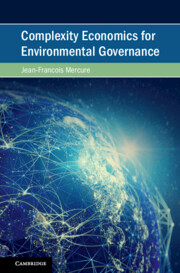Book contents
- Frontmatter
- Contents
- Figures
- Tables
- Preface
- Acknowledgements
- Part I The State of Knowledge and its use in Environmental Economics
- 1 Introducing Complex Environmental Economics
- 2 Complexity, Heterogeneity and Uncertainty as Basis for Policy Analysis
- 3 Modelling Innovation and the Macroeconomics of Low-Carbon Transitions: Equilibrium and Non-equilibrium Paradigms
- 4 Philosophies of Science and the Policy Cycle
- Part II A Positive Theory for Complexity Economics
- Part III Applied Complexity Economics for Environmental Governance
- References
- Index
4 - Philosophies of Science and the Policy Cycle
from Part I - The State of Knowledge and its use in Environmental Economics
Published online by Cambridge University Press: 03 November 2022
- Frontmatter
- Contents
- Figures
- Tables
- Preface
- Acknowledgements
- Part I The State of Knowledge and its use in Environmental Economics
- 1 Introducing Complex Environmental Economics
- 2 Complexity, Heterogeneity and Uncertainty as Basis for Policy Analysis
- 3 Modelling Innovation and the Macroeconomics of Low-Carbon Transitions: Equilibrium and Non-equilibrium Paradigms
- 4 Philosophies of Science and the Policy Cycle
- Part II A Positive Theory for Complexity Economics
- Part III Applied Complexity Economics for Environmental Governance
- References
- Index
Summary
This chapter explores the scientific consistency problems with current economic analysis of policy, offering a way forward to rebuild a consistent framework under the umbrella of complexity economics. A standard simple representation of the policy cycle is used, in order to place the role of scientists and economists into the policy-making process, and thus identify what kind of evidence is used in which stage of the policy-making process. Normative and positive traditions of policy analysis are described, with their respective roles in the policy cycle, and current inconsistencies identified. Inconsistencies in the philosophy of science currently used in economics are discussed. The Lucas critique is reviewed, arguably the main problem in economics. A list is drawn for desired empirical evidence to develop a complexity theory of economics.
- Type
- Chapter
- Information
- Complexity Economics for Environmental Governance , pp. 72 - 100Publisher: Cambridge University PressPrint publication year: 2022



